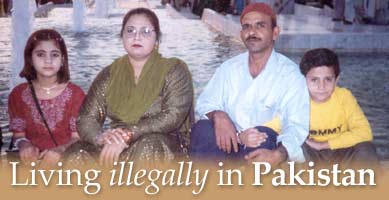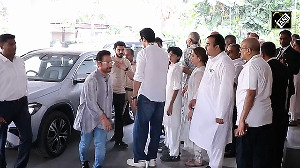
Naim Ahmed was 16 years old when he met Pakistani national Dilshad Bano who was visiting India.
The year was 1982. They liked each other and after Dilshad returned to Pakistan, kept in touch through letters. The distance and volatile border were never a hurdle.
In 1987, they got married and Dilshad moved in with her husband.
Soon the couple had two children, Aksha Naim and Faheem Ahmed. The family lived in Saharanpur in western Uttar Pardesh, where Naim earned enough from his wholesale business in bangles.
In 2001, they travelled to Karachi to meet Dilshad's family. While they were there, in December, the attack on Indian Parliament happened, and all communication and travel ceased between the two countries as they amassed troops at the border.
Ahmed stayed illegally in Karachi for more than two years and returned alone to India on April 22, 2004, by the Samjhauta Express.
He is now fighting to get his children back as they are Indian citizens.
He shared his story with rediff.com:
When I met her [Dilshad Bano] it was love at first sight. We became friends and exchanged letters when she went to Pakistan. In those days we did not have a phone.
I went to Pakistan with my parents and sister in 1984. But her parents rejected my marriage proposal because of the distance between us.
Also, they did not like the idea of marrying off their daughter in India.
I came back, but we stayed in touch. I went to Karachi again in 1987. This time I convinced them and married her. I stayed there for about a month and returned to Saharanpur with her. My children are Indian nationals.
| |||||||||||
After we went to Pakistan, the attack on Indian Parliament happened, and everything changed. The situation became very hostile. Everywhere people starting talking about India and Kashmir. Before that they were not very bothered. and were busy in their work. But now India was the talk of the town.
I wanted to go back to India as soon as my wife got her visa, but the Indians embassy in Islamabad was shut. There was no office in Karachi where I could go. And I didn't know anybody who could guide me. I am not educated so I didn't understand many things. I believed in whatever people told me.
I could not run the risk of going to Islamabad, as I had a visa for Karachi only. The situation was very bad.
However, I wrote letters to the emigration office in Islamabad. My three-month visa was extended twice. But the government finally asked me to leave the country via Dubai. It was too costly for me so I gave up the idea. I wanted to wait for the situation to get back to normal. I started living there illegally.
By then my married life was taking a hit. I wanted my wife to return India but she and her parents opposed it. My children also wanted to return as they were born and brought up in India.
Amidst all this I rented a two-room house in Nafisabad, Karachi. I paid Rs 2,000 a month for it. I also started my bangle business there which did well. I was earning Rs 300 to Rs 500 a day.
But whenever I spoke of going back, my wife started fighting with me. Then I saw the real Pakistan.
My wife and her parents assaulted me and even lodged a police case against me. Police harassment became regular. I could not do anything. The police didn't listen to me because I was an Indian.
I went to the police station several times but they would turn me away at the gate saying I was not entitled to file a complaint because I was an Indian. There was nowhere I could have complained.
The police said I should ask a Pakistani to lodge a complaint on my behalf. Many of my friends knew about my harassment but they didn't help me. I asked so many people to help me go to the police, but nobody came forward. They only sympathised.
There were regular fights in the house and the entire neighbourhood used to assemble to see what was happening. They knew about my problem but did not help me.
Many people advised me not to go to government offices because I was an Indian. And I believed them. I didn't know what to do. Still, I tried meeting some officials, but they didn't entertain me.
My experience there was very bad. It was costly and I could not save anything. There are no schools for ordinary people. Whatever is there is very costly. That was one reason I wanted my children back.
Pakistanis look down upon Indians. Even the mohajirs who are Pakistani citizens are not treated equally. And I was an Indian. They think we Muslims live in India as prisoners. There is so much of hate in their minds.
Anyway, ever since my relationship with my wife soured, I wanted to go back to India with my children. I told her all of us should go back but she would fight with me as soon as I mentioned India. She didn't want to come back and I didn't want to live there. Everyday was a big burden on me. I just wanted to come back.
I was like an alien in Pakistan. I never felt close to the Pakistanis, though I was living with them. I had many friends there but I was always identified as an Indian. That difference always came between us. There was so much of hypocrisy. I could not integrate myself into that society.
My India was always in my mind. I was always thinking about my country. The wonderful days I had here. If nothing then, at least I was a free man in my country.
My wife then deserted me and left home along with our children. I could not do anything to get them back. Finally I decided to leave and reached Lahore. From there, I crossed the border through Samjhauta Express on April 22. I spent around Rs 10,000 to run away from Karachi.
Then I met a lawyer friend in Saharanpur. He helped me draft a petition so I could get my children back. I think of their future. They are not safe there.
I have submitted the petition to the ministry of external affairs, the Pakistan high commission in Delhi, the Indian high commission in Islamabad and the superintendent of police of Sindh province.
I cannot go to Pakistan to fight the legal battle. I cannot afford that. But I am sure I will get my children back as they are Indians and will remain Indians.
Image: Rahil Shaikh






 © 2025
© 2025